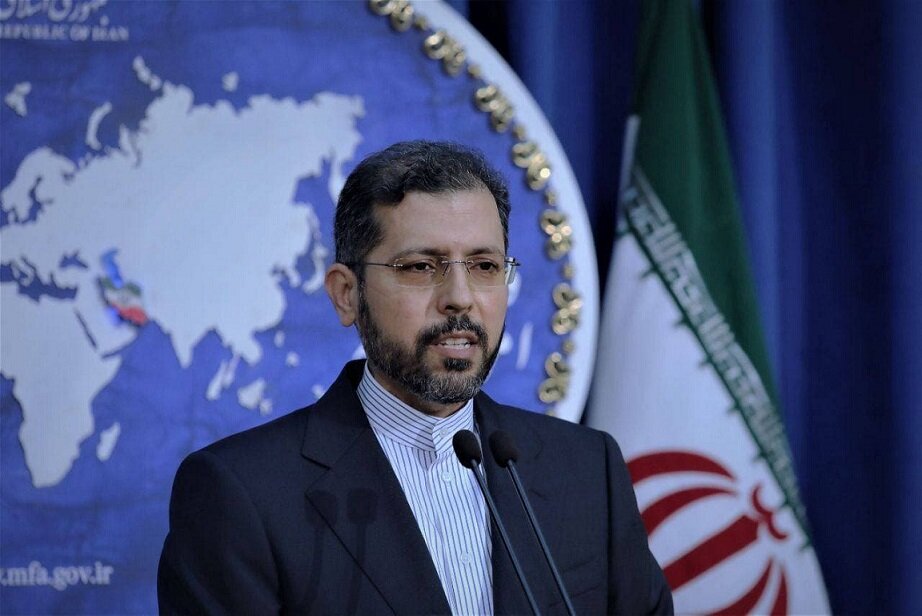Iran welcomes withdrawal of resolution at IAEA

TEHRAN – Iran has welcomed a Western decision to withdraw a U.S.-backed resolution at the International Atomic Energy Agency’s board of governors that would have censured Iran for allegedly not cooperating enough with the UN nuclear watchdog.
“Today's development can maintain the path of diplomacy opened by Iran and the IAEA, and prepare the grounds for the full implementation of commitments by all parties to the JCPOA,” Saeed Khatibzadeh, spokesman for Iran’s Foreign Ministry, said in a statement on Thursday, referring to the 2015 Iran nuclear deal by its acronym.
The spokesman said the plan to adopt an anti-Iran resolution at the International Atomic Energy Agency (IAEA) was shelved thanks to intensive diplomatic efforts in Tehran, Vienna, and the capital cities of all member states of the board of governors, especially the E3, and with the cooperation of China and Russia.
He also expressed hope that the parties to the nuclear deal – formally known as the Joint Comprehensive Plan of Action (JCPOA)- would seize the opportunity to fully implement the nuclear deal.
Iran hopes the parties involved in the JCPOA would be able to tap into this opportunity, and guarantee the full implementation of the JCPOA by everyone through serious cooperation, Khatibzadeh continued.
The European signatories to the JCPOA – France, Germany, and the UK (E3)- were expected to adopt a resolution that would have criticized Iran for reducing nuclear commitments but they canceled their plan to give more time to diplomacy, according to Reuters.
Citing diplomats, Reuters said on Thursday that Britain, France and Germany have scrapped a U.S.-backed plan for the UN nuclear watchdog to criticize Iran for reducing cooperation with its inspectors, in a bid to avoid escalation and make room for diplomacy.
The three European powers, all parties to the 2015 deal, have been lobbying for the International Atomic Energy Agency’s 35-nation board of governors to adopt a resolution at its quarterly meeting this week expressing concern at Iran’s latest breaches, including ending the basis for snap IAEA inspections, Reuters said, adding that the resolution also called on Iran to answer the IAEA’s questions on the origin of uranium particles recently found at several undeclared and apparently old sites. Just as time for a resolution was running out, the IAEA announced a new diplomatic push to get answers from Iran.
IAEA chief Rafael Grossi said the Agency will start talks with Iran in early April to resolve outstanding issues.
“We are trying to sit down around the table and see if we can resolve this once and for all,” Grossi said, noting, “We are going to be starting this process of focused analysis of the situation with a technical meeting which will take place in Iran at the beginning of April which I hope will be followed by other technical or political meetings.”
The E3 issued a joint statement saying they have put on hold their plan to adopt a resolution against Iran at the IAEA board meeting.
“We have decided to pause on this initiative for now, despite clear support within the IAEA board of governors, to allow time for the Director General to conduct the renewed effort he announced to this Board earlier this week to break the deadlock and to clarify and resolve these issues without further delay. We support the DG’s initiative. We hope that Iran will use this time to enter into a substantial dialogue with the Agency on outstanding issues. We encourage the DG to keep the Board informed regarding progress on monitoring and verification in Iran in all its aspects,” the joint statement said.
Iran hailed the E3 decision to scrap their plan to adopt the resolution as a move that prevented unnecessary tension.
“Due to extensive diplomatic consultations at the @iaeaorg, a glimpse of hope is looming to prevent unnecessary tension. Wisdom prevails,” Kazem Gharibabadi, Iran's Ambassador and Permanent Representative to international organizations in Vienna, said in a tweet on Thursday.
Also on Thursday, Iranian President Hassan Rouhani warned that the IAEA should not be a venue for political games.
“The Agency is not a place for political games, and the three European countries should realize that the Agency is a technical institution and should allow it to go ahead with its technical job, so that the recent good deal between Iran and the agency will last,” Rouhani said on Thursday.
“Our nuclear activities are 100% peaceful as always, and the Agency is going ahead with its monitoring work,” the president continued.
“Of course, if the Agency’s monitoring work is not at the Agency’s desired level, the U.S. and its sanctions against Iran are to blame. If these sanctions are removed, relations with the Agency will get warmer and its inspectors can conduct their monitoring work within the framework of the law,” Rouhani pointed out.
The president went on to say that the Iranian nation stood up to the violations and terrorist acts of the previous U.S. administration, urging the new U.S. administration to lift sanctions and make good on its commitments as a goodwill gesture.
He also reiterated Tehran’s long-held position that Iran will not renegotiate the JCPOA, underlining the country will immediately begin to fulfill all of its obligations under the deal once the U.S. lifts sanctions.
The U.S. is yet to lift sanctions but it supported the Europeans in withdrawing the proposed resolution, a move that is seen as a gesture to pave the way for diplomacy with Iran in the coming weeks.
SM/PA
